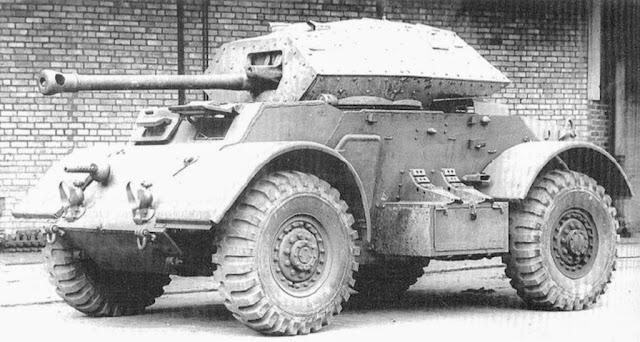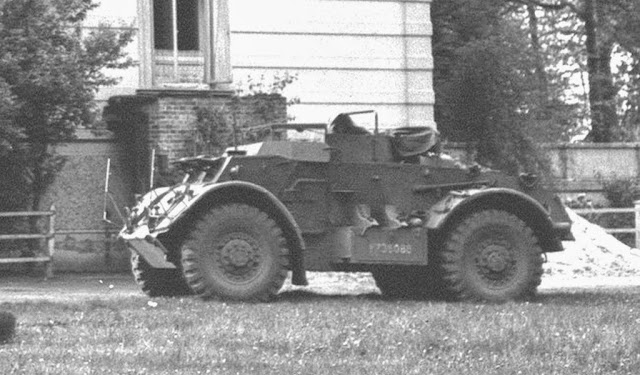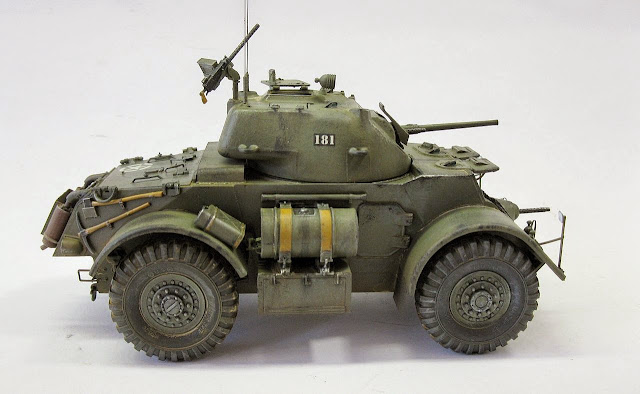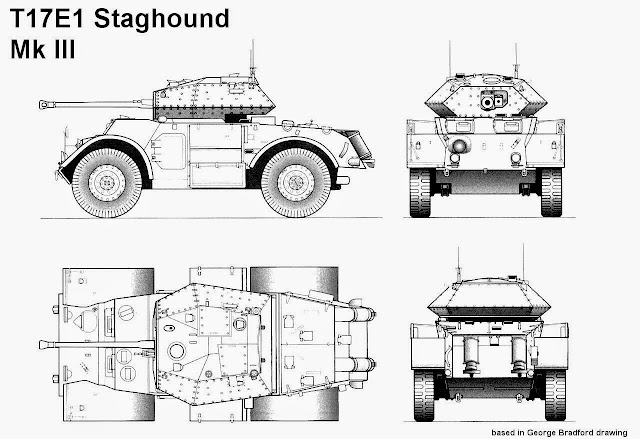Tankers!!
We'll let the tracks a little aside and see some armored vehicles on wheels. How about seeing some American girls who were very dear by Canadians: STAGHOUNDS !!!
History:
The T17 and the T17E1 were two American armored car designs produced during the Second World War. Neither saw service with frontline US forces but the latter was supplied, via the United Kingdom, to British and Commonwealth forces during the war and received the service name Staghound. A number of countries used the Staghound after the war, with some of the vehicles continuing to serve into the 1980s.
 |
| British Staghounds Mk I in recce patrol. Normandy, July, 1944. |
In July 1941, the US Army Ordnance issued specifications for a medium armored car alongside a specification for heavy armored car (which resulted in the T18 Boarhound).
 |
| T18 Boarhound 8x8 AC |
The Ford Motor Company built a six wheels, all driven (6 x 6) prototype which was designated T17 and Chevrolet a four wheels, all driven (4 x 4) model designated T17E1. At the same time, the British Purchasing Commission was also looking for medium and heavy armored cars for use in the war in North Africa. Had the U.S. adopted this, it would have been called the M6.
Both the T17 and T17E used the same turret which was designed by Rock island Arsenal with British requirements driving some of the design features such as putting at least two crew in the turret and placing the radio in the turret so that it was close to the commander.
T17
The T17 was armed with a M6 37 mm gun in a rotating turret, a coaxial and bow M1919 Browning .30 machine gun. Power was from two Hercules JXD engines. In the interests of standardization, these replaced Ford's initial 90 hp engines.
 |
| T17 Deerhound 6x6 AC |
The British gave the name Deerhound to the T17. Production started in October 1942. The US military eventually decided to adopt the lighter M8 Greyhound vehicle instead; as an interim measure T17 production continued until M8 production could be started.
 |
| M8 Greyhound 6x6 AC |
These were to be supplied as "International Aid" but US Army tests in early 1943 showed the T17 was lacking compared to the T17E and so Britain turned them down. The 250 units produced were disarmed and given to the United States Army Military Police Corps for use in the States.
T17E1
The British allocated the name Staghound to the T17E series. British liaison officers had had contact with Macpherson, the Chevrolet engineer in charge of the project and felt they had influenced him sufficiently to produce something that met all their requirements.
 |
| T17E1 Staghound 4x4 AC |
Accordingly in December the British Purchasing Commission "formally requested" production of 300 vehicles; the US Army authorized production of 2000 in January 1942. The British order was confirmed in March 1942 when the pilot T17E was delivered to the Aberdeen Proving Ground. Testing showed flaws but these were expected to be correctable and a further 1,500 were contracted for. Production started in October 1942. The US Army convened a board to examine the state of the multitude of armored car projects and recommended in December 1942 the cancellation of the larger designs and standardization on a smaller vehicle. This lighter vehicle would appear as the M8 Greyhound vehicle. However the British applied for T17E1 production to be continued for the United Kingdom under Lend-Lease. Approximately 4,000 Staghounds were produced in total.
The Staghound was an innovative design that incorporated some advanced features. It had two rear-facing 6-cylinder engines with automatic transmissions (with 4 forward and 1 reverse gears) feeding through a transfer case to drive both axles. Either two- or four-wheel drive could be selected.
Either engine could be shut down while in motion and taken out of the drive train. Additionally, a power steering pump was incorporated that could be switched on or off manually from the driver's instrument panel depending on steering conditions. Steering and suspension components were directly attached to the hull as the structure was rigid enough to dispense with the need for a separate chassis.
Operational service
The Staghound entered service too late for use in the North African Campaign where its combination of armor, range and main armament would have been an advantage in a light forces reconnaissance role. As a result, it first saw operational service in Italy, where many units found its large physical size too restrictive in the narrow roads, and streets of Europe. It saw most service at squadron and regimental headquarter level; an armoured car regiment having three Staghounds with the Regimental HQ and three with each HQ of the four squadrons in the regiment. Conditions for the Staghound improved when the Italian campaign became more mobile in the middle of 1944, and the Staghound was also used in north-west Europe campaign.
After the war, the Staghounds were distributed among smaller NATO countries in Europe and to the Middle East.
T17E1: 4x4 version built by Chevrolet for Britain. 2,687 - 2,844 units were produced.
Staghound Mk I:
The T17E1 was armed with a 37 mm M6 gun, a coaxial .30 cal Browning 1919A4 machine gun and a 2-inch smoke mortar in a rotating turret. In the hull was mounted a .30 cal Browning 1919A4 machine gun. Some T17E1 had an additional .30 Browning 1919A4 cal machine gun for anti-aircraft defense. The turret had power traverse and featured a turret basket (which limited the amount of internal crew storage).
 |
| Staghounds Mk I from 4th Canadian Armoured Division crossing the Seine River Summer, 1944. |
 |
| Staghound Mk I showing his 37mm gun |
The variant saw combat with the British, Free Polish, Canadian, New Zealand, Indian, and Belgian armies in Italy, Greece and Northwest Europe. After WWII, it saw further action in Cuba, Nicaragua, Lebanon and Rhodesia.
Staghound Mk II CS (Close Support):
This was a field conversion that had a 3 inch howitzer Mk 1 for close support mounted in place of the 37 mm gun in the turret.
 |
| Staghound Mk II CS (Canadian) - Notice the 3inch. howitzer and the absence of machine gun in the front bow. |
The bow machine gun was removed. It is not known how many were converted. These were issued to the Armoured Car HQ section.
Staghound Mk III:
Had a turret taken from an Crusader tank armed with Ordnance QF 6 pounder gun and 7.92 mm Besa coaxial machine gun. As the goal of the Staghond Mk.III was to allow greater firepower from high-explosive projectiles for infantry support or reconnaissance missions, the Ordnance QF 6 pounder gun was replaced by the Ordnance QF 75 mm gun on the production line, as the 75mm QF had a much more efficient HE projectile.
The operational vehicles was no front bow machine gun. These had reached the front line by 1945, where it was supplied to heavy troops of armored car regiments.
 |
| Staghound Mk III - (prototype): Notice the .30 in front bow The operational cars don't have this machine gun. |
 |
| Staghound Mk III from12th Manitoba Dragons 2nd Canadian Corps Armoured Car Regiment - Germany, 1945. |
The total number ordered was around 100-300. After WWII, this version saw usage with Denmark and combat in Lebanon.
Staghound Command:
The turret was removed and extra wireless equipment was installed. Field adaptation with many variations:
 |
| Staghound Command - Canadian - 1944. |
 |
| Staghound Command - Notice the windshield made with perspex field adaptation |
T17E2
Staghound AA:
The T17E2 was an T17E1 fitted with a Frazer-Nash-designed turret mounting two .50 M2 Browning heavy machine guns.
The turrets were built in the US for British Motor Torpedo Boats. Redesign of the turret and mounting was carried out. 2,610 rounds were carried. The turret was open-topped and had an electric-hydraulic traverse system with a maximum slew rate of 55 degrees a second.
It had a reduced crew of 3: commander/gunner, loader and driver.789 units were produced between October 1943 and April 1944, when production stopped.
T17E3
Staghound Howitzer:
T17E1 fitted with the turret of 75 mm Howitzer Motor Carriage M8, carrying the 75mm M2/M3 howitzer. This was trialled in December 1943, but never reached production.
- Other versions of Staghounds:
- Staghound Mk1. Tulip with 4x60lb Rockets - This field conversion was used on only a handful of Canadian Staghounds in the late war period. The Staghound wore a pair of similar racks but with four 60 lbs. rockets, similar to the Sherman IC (M4A4) Tulip, but with two rails on each side. Like the Sherman tank, the conversion was tagged as Tulip. The Staghound Tulip served with the XII Manitoba Dragoons in France, 1944. The rockets were not especially accurate at long range, and at short range the fuze often failed to detonate the warhead. First Canadian Army recommended further study, but cancelled a February 1945.
 |
| Staghound Tulip |
Instead, Canadian Military Headquarters sponsored an effort in Britain by No 1 Canadian Base Workshop to adapt the 3-inch (76mm) and 5-inch (125mm) rockets – types already allocated to First Canadian Army for the Land Mattress artillery rockets.
 |
| Staghound with Land Mattress artillery rockets |
This placed four rockets in box launchers on either side of the turret. The main problem with this arrangement was that the backblast from the rockets was so severe that it damaged the rear mudguards.
 |
| Staghound with Land Mattress artillery rockets firing... |
 |
| Staghound with Land Mattress artillery rockets - notice the damage in the rear fender. |
- Staghound Bantu - mine detector:
Anti-personnel mines were (and are) a major concern of Armies. The detection and subsequent removal of these devices require long and extreme risk to the engineers. This concern originated interest in fielding an engineer version of the Staghound to counter the threat of German anti-tank mines. A prototype was constructed in the spring of 1944 using the Lulu mine detector from Sherman.
 |
| Sherman Lulu mine detector |
In the Staghound, this apparatus was called Bantu.
 |
| Staghound Bantu |
This elaborate contraption contained detector coils within wooden drums that were pushed in front of the Staghound. A corresponding device, the AMRCR (anti-mine reconnaissance castor roller), was a mine-rolling system designed to detonate anti-tank mines sufficiently far in front of the Staghound to prevent damage from the blast.
 |
| Sherman V with AMRCR (anti-mine reconnaissance castor roller) |
However, both systems proved too cumbersome for actual field conditions and in neither case did development proceed beyond trials.
- Staghounds with AEC turrets:
Post-WWII version, this vehicle was modified by adding the entire turret from AEC Mark III Armored Cars in Staghounfs Mk III chassis. Used by lebanon, in 1956.
 |
| Staghouind Mk III with 75mm AEC turret |
Walkaround:
Specs:
Specs:
| T17E1 Armored Car Staghound Mk I/III | |
|---|---|
Place of origin Type
|
United States
armored car
|
Service history
| |
In service
|
1944- 1980s
|
Used by
|
British, Free Polish, Canadian, New Zealand, Indian, and Belgian
|
Wars
|
World War II
|
Production history
| |
Designer
| |
Produced
|
1942-43
|
Number built
|
4,000
|
Specifications (Staghound Mark I)
| |
Weight
|
14 t
|
Length
|
5.49 m
|
Width
|
2.69 m
|
Height
|
2.36 m
|
Crew
|
5 Mk I - 4 Mk III
|
9 to 44 mm
| |
Main
armament
|
37 mm M6 Mk I - 75mm Ordnance QF - Mk III
|
Secondary
armament
|
2 or 3 x .30 (7.62 mm) machine guns
|
Engine
|
2 x GMC 270
2 x 97 hp (72 kW)
|
Power/weight
|
13.9 hp/tonne
|
Suspension
|
wheels, 4 x 4
|
Operational
range
|
724 km
|
Speed
|
89 km/h
|
- The kits:
- For this project, I'll use these kits:
 |
| Bronco's Staghounds |
- Starting:
 |
| My cave... |
 |
| Sprues in my workbench... |
 |
| Building the hulls... |
 |
| Like a turtle... |
 |
| The two Girls... |
I will concentrate first on the Mk III:
 |
| Closing the hull... |
 |
| Suspensions and wheels...The carpet monster eat two little parts of front suspension... |
 |
| Notice the exhausts guards in PE |
 |
| Whit shoes for alignment |
 |
| Tcharans !!!! |
 |
| Turret and details...The gun is RB Models. |
 |
| Almost ready for painting... |
 |
| The MG .30 is RB Models too... |
 |
| The two sisters... |
The Bronco's 37mm gun is hybrid: part metal, part plastic: awful. I replace by a metal one from RB Models:
 |
| The awful and the awesome... |
 |
| The Mk I ready for painting, too |
 |
| Mk I |
 |
| Mk III |
Next step, markings !!!
The colors:
 |
| Manitoba Dragons Staghounds... |
 |
| T17E1 Staghoung Mk I - 12th Manitoba Dragons 2nd Canadian Corps Armoured Car Regiment - Belgium, 1944. |
 |
| T17E1 Staghoung Mk III - 12th Manitoba Dragons 2nd Canadian Corps Armoured Car Regiment - Germany, 1945. |
And the Girls in weathering and finalized: First of all, the T17E1 Staghoung Mk I with colors of 12th Manitoba Dragons - 2nd Canadian Corps Armoured Car Regiment - Belgium, 1944.
 |
| T17E1 Staghoung Mk I - 12th Manitoba Dragons 2nd Canadian Corps Armoured Car Regiment - Belgium, 1944. |
 |
| T17E1 Staghoung Mk I - 12th Manitoba Dragons - left side |
 |
| T17E1 Staghoung Mk I - 12th Manitoba Dragons - right side |
 |
| T17E1 Staghoung Mk I - 12th Manitoba Dragons with Kojak |
 |
| T17E1 Staghoung Mk I - 12th Manitoba Dragons with Kojak and Rover, the dog. |
Now, the upgunned T17E1 Staghoung Mk III wearing colors of 12th Manitoba Dragons - 2nd Canadian Corps Armoured Car Regiment - Germany, 1945.
 |
| T17E1 Staghoung Mk III - 12th Manitoba Dragons 2nd Canadian Corps Armoured Car Regiment - Germany, 1945. |
 |
| T17E1 Staghoung Mk III - 12th Manitoba Dragons - left side |
 |
| T17E1 Staghoung Mk III - 12th Manitoba Dragons - right side |
 |
| T17E1 Staghoung Mk III - 12th Manitoba Dragons with Kojak |
 |
| T17E1 Staghoung Mk III - 12th Manitoba Dragons with Kojak and Rover, the dog. |
 |
| T17E1 Staghoungs Mk I and Mk III - 12th Manitoba Dragons |
 |
| T17E1 Staghoungs Mk I and Mk III - 12th Manitoba Dragons |
Well, this is the final building of the Bronco's kits. But I had on my shelf already built two relics of the heroic modeling times: one Staghound Mk I from ADV Azimut and a Mk III made with ADV's hull and Italeri Crusader's turret. I changed the Mk I gun by a Plastruct styrene tubing (3,2mm) to reproduce the 3 inch. howitzer, built a new mantlet and transforming the Mk I in Mk II CS and replaces the Mk III 75mm gun by AFV scrap 6 pounds of my Churchill projects. With that, I got a Mk III early.
The Mk I Azimut looked like this:
 |
| Old ADV resin kit - Mk I with 37mm gun Almost a solid block of resin... |
After the exchange of the gun and scratch new gun armour, a touch up paint and application of correct markings: T17E1 Staghound Mk II CS - Markings (Bison Decals - #35063) from 12th Manitoba Dragons - 2nd Canadian Corps Armoured Car Regiment - Victory Parade - Amsterdan, 1945.
 |
| T17E1 Staghound Mk II CS - 12th Manitoba Dragons 2nd Canadian Corps Armoured Car Regiment Victory Parade - Amsterdan, 1945. |
 |
| Staghound Mk II CS - 12th Manitoba Dragons Notice the new armoured mantlet and howitzer. |
And the ADV Staghoung Mk III with Italeri's Crusader turret and spurious markings (sorry...old times...):
 |
| ADV Staghound Mk III with wrong markings... |
The Mk III early, with Ordnance QF 6 pounder gun from my spare box parts. After the plastic surgery, the T17E1 Staghound Mk III early from 12th Manitoba Dragons - 2nd Canadian Corps Armoured Car Regiment in Germany, 1945.
 |
| T17E1 Staghound Mk III early - 12th Manitoba Dragons 2nd Canadian Corps Armoured Car Regiment Germany, 1945. |
 |
| T17E1 Staghound Mk III early |
The new-old girls:
 |
| Resin kits...Old times... |
The new and old: Mk I and Mk II:
 |
| Bronco and ADV... |
...and the Mk III's:
 |
| Bronco and ADV Mk III's. |
The Staghounds:
Well...plus four armoured cars in my collection!!
Thanks, Gents!!
See you soon...very soon !!!








































Again nice projects my friend ! I'll follow with great care. Thanks for the visit of the bunker'cave too, it's a nice place for modeling. I read you soon my dear friend !
ResponderExcluirGreat wip friend with a lot of information!!!!!As always a great job of documentation.Thanks for sharing!!!
ResponderExcluirCiao
Nice!
ResponderExcluirWhat a magnificent reportage (once again), and great photo sets.
:) extras are to bottom, a small peek into the Serra "innermost"
Happy Easter, my distant friend.
@Alain:
ResponderExcluirMi casa es su casa, Alain...is always a pleasure to welcome you here ...Happy Easter!!!
@Luigi:
Love the historical background of the vehicles...Big hug and Happy Easter!!!
@Maximex:
Thanks, my Finn friend... Happy Easter to you and your family too...Peace and health !!!!
That's very interesting! I love wheels, wish to see the next steps :-)
ResponderExcluirHi, Sergei...sorry my delay...
ResponderExcluirthanks , man...stay tunned !!!
Big hugs !!!
Very nice Staghounds but my favorite is the Mk I. This type has been used by the Belgian army during and after WWII. My father was mechanic in the belgian army just after WWII and there were this type of armored cars in his unit.
ResponderExcluirThe Mk III is quite ugly but intresting to have in a Staghound serie.
Nice job my friend !
Wow, Alain...Very interesting story about his father. I think fascinating these memories about the old days ...Thanks for your visit, my friend...All the best !!!
ResponderExcluirI love these new builds of yours. Mk III is very impressive!
ResponderExcluirvery nice, goog job.
ResponderExcluirHi, Normand 1429...Thanks for your visit and incentive, my friend...The Bunker is ours!!! Hugs!!
Excluir